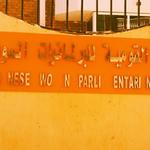Criminalizing FGM in Sudan: A never ending story?
After decades of efforts to end female genital mutilation (FGM) in Sudan, the prevalence of the practice is still staggering. A household survey conducted in 2010 shows that 88 percent of adult Sudanese women, 83.7 percent of girls between 15 and 19, and 72.2 percent of girls between 10 and 14 years have been circumcised.
The British colonial rule was the first to confront FGM and criminalized pharaonic version, the most extreme form of FGM, in 1946. However, they did not criminalize the Sunna circumcision because they were afraid to upset the religious clergy. Ever since, there have been heated debates about the Islamicness of the Sunna circumcision. The discussions reached a climax in 2009, when the draft of the National Child Act was announced. Article 13 criminalized FGM in all its forms, and the arguments for criminalization were rooted in Islam.
The initiative to criminalize FGM came from the National Council for Child Welfare, under the Ministry of Welfare and Social Security (the ministry responsible for women’s affairs) as part of the preparations for a national child act. Pressure from civil society, international organizations and UN agencies played a major role. At the forefront were arguments about the detrimental health effects of FGM and its impact on Sudan’s high maternal mortality rates. Women inside and outside of the government were deeply concerned about the high prevalence rates of FGM after decades of efforts to eradicate the practice through awareness raising and other means.
But also Islamic arguments played an important role in the process. The main Islamic argument used against FGM was that the Quran prohibits human beings from changing the creation of God (khalqulla). According to interviewees conducted during our fieldwork in Khartoum in February 2015, “Islam forbids to do harm and there is medical evidence of the extensive damage FGM causes to women’s bodies and minds”.
The draft law was met with a massive counter-mobilization by the conservative Salafi movement in the country. They called for eradication of the pharaonic circumcision which they regarded as backwards and un-Islamic, but claimed that the Sunna version is Islamic and that criminalizing it would be in opposition to sharia. Those advocating for criminalization, including Islamist women, were framed as blindly following the ‘West’ and a foreign agenda even among their peers in the Islamist ruling party.
Despite the fact that the President signed a national strategy to eradicate FGM, he ordered article 13 to be removed from the final version of the law.
According to an activist;
“We attempted to insert an article, article 13, in the National Child Law. But it was dropped by the President. He was under pressure from the ICC. He started to talk to the Salafists who advocate the Sunna circumcision. They say it is Islamic. Against this backdrop, the criminalization of FGM was portrayed as an intrusion from the West; That the National Council for Child Welfare, a government institution, was working for the UN. (…). The “no” came from the supreme leader himself”
Still, women in civil society as well as within the government have not given up on the project to criminalize FGM. First, they went to the state level and attempted to criminalize FGM in state child acts. They have been successful in the three Darfur states as well as in the two eastern states of Gedarif and Red Sea. South Kordofan, bordering South Sudan, even preceded the national center as it criminalized FGM in all its forms in 2009.
But there is undoubtedly a need for a national law. Two strategies are considered; either a separate FGM law or inserting it as an article in the criminal law. The director of the National Council for Child Welfare stated in an interview that “we planned two strategies so if the separate FGM law is rejected/resisted, we may still succeed with amending the criminal law. We are now intensifying the advocacy and lobby to ensure political support for a national law criminalizing FGM”.
The first initiative to criminalize FGM came from the National Council for Child Welfare backed by the Minister of Welfare Amira al-Fadil. The ongoing attempt is trying to work through Sudan’s National Assembly and its women’s caucus. The change of strategy can be explained by the fact that Amira al- Fadil, known to be a reformist, was replaced after the attempt to criminalize FGM, by a Minister who is known to be more conservative.
The current parliament is almost entirely composed of Islamists, many of them considered to be hardliners; men as well as women. Any attempts to criminalize FGM will probably be met with fierce resistance. But there is an election coming up. The list of female candidates for the election was recently released, and it is a pleasant surprise that some of the hardliner women who defend the Sunna circumcision have been replaced by reformists like Amira al-Fadil. In addition, some of the hardline men, like Dafallah Hassabo, who has been extremely vocal for Sunna circumcision, have been removed from the list. There is therefore a slight hope that a law criminalizing FGM can be passed in the new national assembly. According to Sudanese staff at UNFPA “We are hoping that a law will be passed, but we are well aware that it will face challenges (…)”.
At the very least there is a hope for more women friendly reforms in the next parliamentary period, even if all the women ‘elected’ are from the Islamist party.
By Samia al-Nagar and Liv Tønnessen






